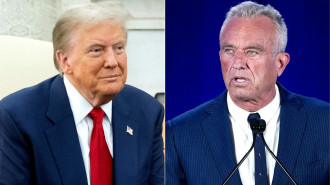Jewish prayer at Al Aqsa mosque compound now 'routine', violating status quo
Jewish prayer at the Al Aqsa Mosque complex has now become "routine" enabled by Israeli police on a daily basis, Israeli media reported, citing Jewish extremists campaigning for regular prayer and a division of the site.
According to the Israeli news site the Times of Israel, the practice took place on Wednesday, where an afternoon Jewish prayer was carried out loudly.
Jewish extremists who repeatedly attempt to pray at the Al-Aqsa Mosque in defiance of a long-standing status quo said there were prayer services taking place during the morning and afternoon services every day.
Such a move violates a longstanding international agreement, which stipulates that Jews are not allowed to pray on the site.
Non-Muslims and unsolicited visits are forbidden under international agreements from praying at the Islamic site, which is considered one of the three holiest sites in the faith.
Israeli extremists, protected by authorities, have long violated the agreement and allowed for raids, prayers, and religious rituals to be carried out on-site, sometimes along with far-right politicians such as national security minister Itamar Ben-Gvir.
However, since Israel's war on Gaza on 7 October, there has been an uptick in Jewish extremists forcibly praying on site, without police detaining or removing them for prostrating.
Previously, Israeli police would instruct extremists to refrain and not to engage in any demonstrative prayer, but this has become less common.
Since 13 August, the date of the Jewish Fast of the Ninth of Av, when extremists accompanied Ben-Gvir to the site and prayed out loud, police have stopped detaining or removing others who do the same.
Ben-Gvir insisted that Jewish prayer should be allowed at the site, while Israeli Prime Minister Benjamin Netanyahu has played down the development, saying there was "no change to the official status quo on the Temple Mount".
During the religious rituals, extremist rabbis gave sermons, with Ben-Gvir later saying he would put a synagogue on the site if he could.
Change in status quo
Palestinians have for a long time raised serious concerns that the incursions and Jewish prayer at the site are part of a process to lay the groundwork for the mosque to be divided between Muslims and Jews, following how the Ibrahimi Mosque in Hebron was split in the 1990s.
Jews refer to the site as the Temple Mount, seen as a highly provocative term by Muslims, and is where Jews believe two ancient temples once stood.
The first temple was believed to have been built by King Solomon and destroyed by the Babylonians and the second temple was destroyed by the Romans.
On the southwest side of the mosque's ancient walls is the Western Wall, another term deemed provocative by Muslims. Jews believe the site is the only surviving remnant of the second temple following its destruction by the Romans.
Last month, Ben Gvir said the "Temple Mount is undergoing change" speaking at a conference in Israel’s parliament.
"They always tell me 'political leadership' is against it. I am the political leadership. And the political leadership allows Jewish prayer on the Temple Mount," he continued.
However, Israeli politician Benny Gantz reiterated that there was no change to the status quo.
"Despite the provocative and irresponsible rhetoric by some, Israel is committed to preserving this historic status and has no intention of changing it. The freedom of worship will always be guaranteed at the holy site," he wrote on X.







 Follow the Middle East's top stories in English at The New Arab on Google News
Follow the Middle East's top stories in English at The New Arab on Google News
![The new film casts Israeli actors to tell the story of Mary while leaving out Palestinians [Getty]](/sites/default/files/styles/image_330x185/public/2024-11/GettyImages-2172155541.jpg?h=199d8c1f&itok=wJWyXDEQ)
![Ben & Jerry's has taken Unilever to court for its alleged attempts to silence it [Getty]](/sites/default/files/styles/image_330x185/public/2024-11/GettyImages-2183900214.jpg?h=199d8c1f&itok=jEcYtQ64)
